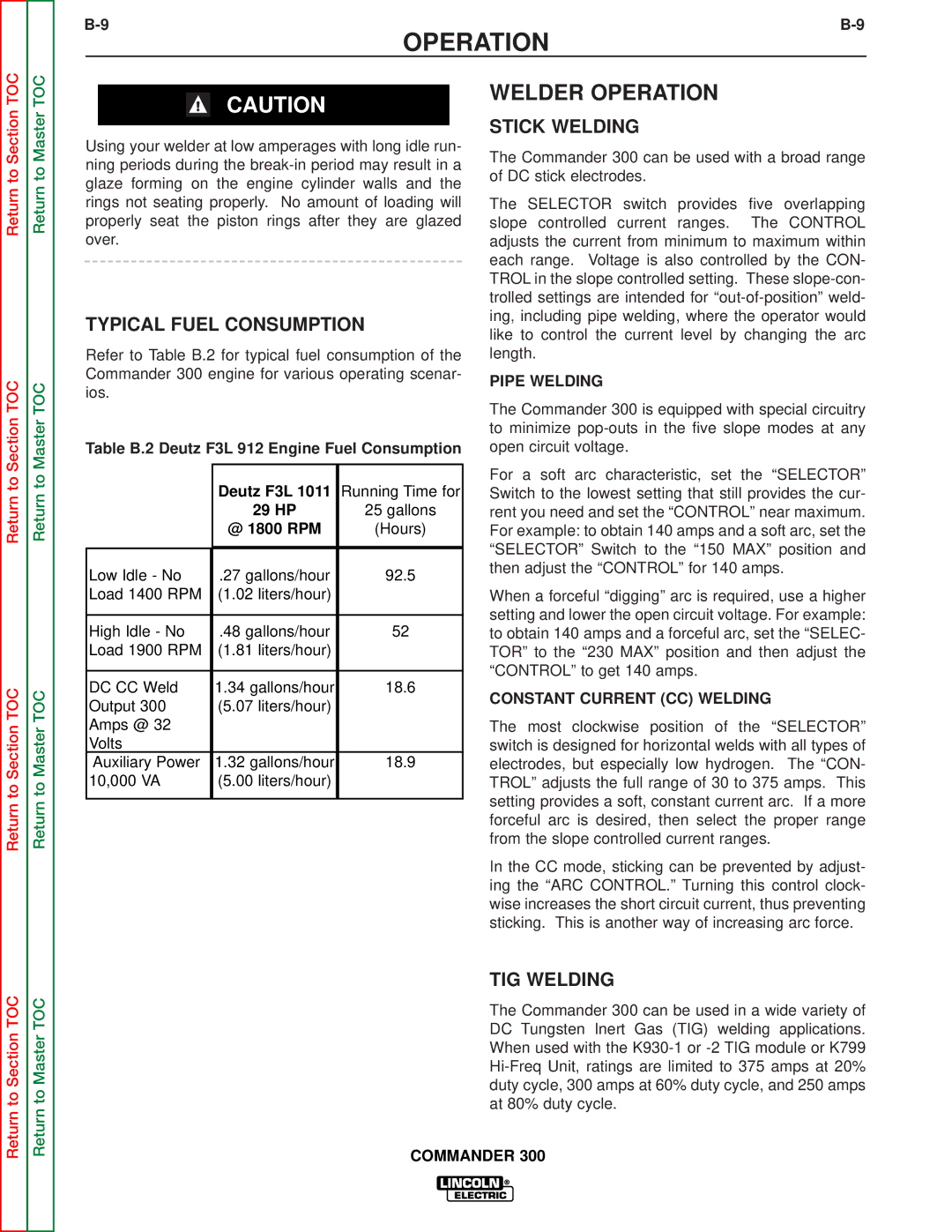
OPERATION
Master TOC
CAUTION
WELDER OPERATION
STICK WELDING
Return to Section TOC
Return to Section TOC
Return to Section TOC
Return to Section TOC
Return to
Return to Master TOC
Return to Master TOC
Return to Master TOC
Using your welder at low amperages with long idle run- ning periods during the
TYPICAL FUEL CONSUMPTION
Refer to Table B.2 for typical fuel consumption of the Commander 300 engine for various operating scenar- ios.
Table B.2 Deutz F3L 912 Engine Fuel Consumption
| Deutz F3L 1011 | Running Time for |
| 29 HP | 25 gallons |
| @ 1800 RPM | (Hours) |
|
|
|
Low Idle - No | .27 gallons/hour | 92.5 |
Load 1400 RPM | (1.02 liters/hour) |
|
|
|
|
High Idle - No | .48 gallons/hour | 52 |
Load 1900 RPM | (1.81 liters/hour) |
|
|
|
|
DC CC Weld | 1.34 gallons/hour | 18.6 |
Output 300 | (5.07 liters/hour) |
|
Amps @ 32 |
|
|
Volts |
|
|
Auxiliary Power | 1.32 gallons/hour | 18.9 |
10,000 VA | (5.00 liters/hour) |
|
|
|
|
The Commander 300 can be used with a broad range of DC stick electrodes.
The SELECTOR switch provides five overlapping slope controlled current ranges. The CONTROL adjusts the current from minimum to maximum within each range. Voltage is also controlled by the CON- TROL in the slope controlled setting. These
PIPE WELDING
The Commander 300 is equipped with special circuitry to minimize
For a soft arc characteristic, set the “SELECTOR” Switch to the lowest setting that still provides the cur- rent you need and set the “CONTROL” near maximum. For example: to obtain 140 amps and a soft arc, set the “SELECTOR” Switch to the “150 MAX” position and then adjust the “CONTROL” for 140 amps.
When a forceful “digging” arc is required, use a higher setting and lower the open circuit voltage. For example: to obtain 140 amps and a forceful arc, set the “SELEC- TOR” to the “230 MAX” position and then adjust the “CONTROL” to get 140 amps.
CONSTANT CURRENT (CC) WELDING
The most clockwise position of the “SELECTOR” switch is designed for horizontal welds with all types of electrodes, but especially low hydrogen. The “CON- TROL” adjusts the full range of 30 to 375 amps. This setting provides a soft, constant current arc. If a more forceful arc is desired, then select the proper range from the slope controlled current ranges.
In the CC mode, sticking can be prevented by adjust- ing the “ARC CONTROL.” Turning this control clock- wise increases the short circuit current, thus preventing sticking. This is another way of increasing arc force.
TIG WELDING
The Commander 300 can be used in a wide variety of DC Tungsten Inert Gas (TIG) welding applications. When used with the
